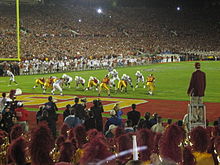
Back Bowl Game German Bowl Spanish Bowl (football américain) French ボウル・ゲーム Japanese Bowl game SIMPLE Bowl Swedish 碗赛 Chinese
This article has an unclear citation style. (September 2023) |


In North America, a bowl game, or simply bowl, is one of a number of postseason college football games that are primarily played by teams belonging to the NCAA's Division I Football Bowl Subdivision (FBS). For most of its history, the Division I Bowl Subdivision had avoided using a playoff tournament to determine an annual national champion, which was instead traditionally determined by a vote of sports writers and other non-players. In place of such a playoff, various cities across the United States developed their own regional festivals featuring postseason college football games. Prior to 2002, bowl game statistics were not included in players' career totals. Despite attempts to establish a permanent system to determine the FBS national champion on the field (such as the Bowl Coalition from 1992 to 1994, the Bowl Alliance from 1995 to 1997, the Bowl Championship Series from 1998 to 2013, and the College Football Playoff from 2014 to the present), various bowl games continue to be held because of the vested economic interests entrenched in them.
Bowl games originally featured the very best teams in college football, with strict bowl eligibility requirements for teams to receive an invitation to a bowl game in a particular year; as of 1971, there were only 10 team-competitive (as compared to all-star) bowl games. The number of bowl games has grown, reaching 20 games by the 1997 season, then rapidly expanding beyond 30 games by the 2006 season and 40 team-competitive games, not including the College Football Playoff National Championship, by the 2015 season. The increase in bowl games has necessitated a virtual elimination of the NCAA bowl eligibility rules, since reduced to allow teams with non-winning 6–6 records (numerous teams since 2002 season, including 21 such teams in the suddenly 43-bowl 2023 season) and even losing 5–6 and 5–7 seasons (numerous teams since the 2001 season, including one such team in the 43-bowl 2023 season, meaning over one quarter of the teams that bowl season did not have winning records) to fill many of the increasingly available bowl slots.
The term "bowl" originated from the Rose Bowl stadium, site of the first postseason college football games. The Rose Bowl Stadium, in turn, takes its name and bowl-shaped design from the Yale Bowl, the prototype of many football stadiums in the United States. The term has since become almost synonymous with any major American football event, generally collegiate football with some significant exceptions. Two examples are the Egg Bowl, the name of the annual matchup between the Mississippi State Bulldogs and the Ole Miss Rebels, and the Iron Bowl, a nickname given to the annual game between the Alabama Crimson Tide and the Auburn Tigers. In professional football, the names of the National Football League (NFL)'s Super Bowl and Pro Bowl are references to college football bowl games.
The use of the term has crossed over into professional and collegiate Canadian football. A notable example is the annual Banjo Bowl between the Winnipeg Blue Bombers and Saskatchewan Roughriders of the Canadian Football League (CFL). In Canadian university football, which has determined its national champions on the field for several decades, the "bowl games" are the two semi-final games that determine the participants in the Vanier Cup national championship game; since 2002 these have been the Uteck Bowl and the Mitchell Bowl. The matchups are determined on a conference rotation basis, with the Uteck Bowl being played at the easternmost host team, while the Mitchell is at the westernmost host team.